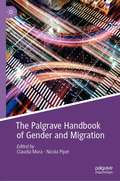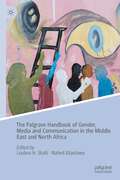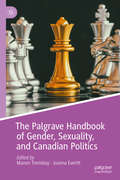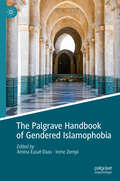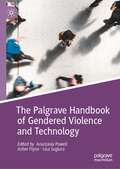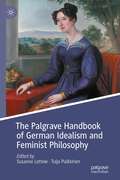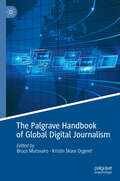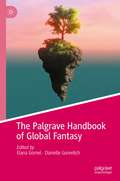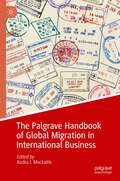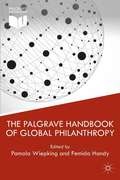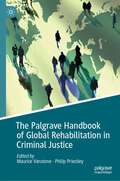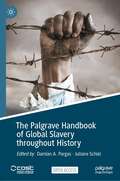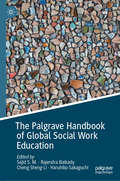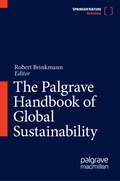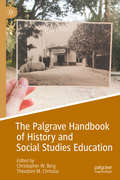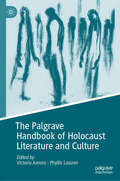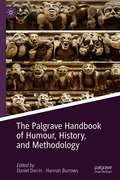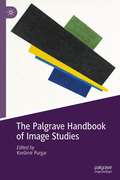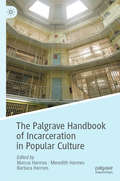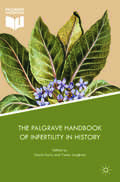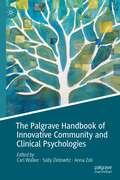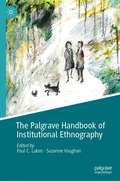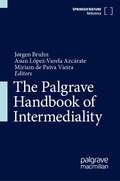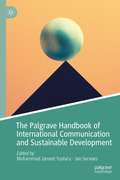- Table View
- List View
The Palgrave Handbook of Gender and Healthcare
by Ellen Kuhlmann Ellen AnnandaleAn authoritative, state-of-the-art collection that brings together key experts to provide an overview of the field. This new paperback edition includes 3 new chapters on human resources and health, end-of-life care and complementary and alternative medicine as well as thorough updates to the introduction and conclusion.
The Palgrave Handbook of Gender and Migration
by Nicola Piper Claudia MoraThis handbook adopts a distinctively global and intersectional approach to gender and migration, as social class, race and ethnicity shape the process of migration in its multiple dimensions. A large range of topics exploring gender, sexuality and migration are presented, including feminist migration research, care, family, emotional labour, brain drain and gender, parenting, gendered geographies of power, modern slavery, women and refugee law, masculinities, and more. Scholars from North and South America, Europe, Asia, and Oceania delve into institutional, normative, and day-to-day practices conditioning migrants´ rights, opportunities and life chances based on material from around the world. This handbook will be of great interest to students and scholars across a range of disciplines, including Women’s and Gender Studies, Sociology, Sexuality Studies, Migration Studies, Politics, Social Policy, Public Policy, and Area Studies.
The Palgrave Handbook of Gender, Media and Communication in the Middle East and North Africa
by Nahed Eltantawy Loubna H. SkalliThe Palgrave Handbook of Gender, Media and Communication in the Middle East and North Africa stands as an authoritative and up-to-date resource on the critical debates, research methods and ongoing reflections on how gender and communication intersect with the economic, social, political, and cultural fabrics of the countries in the MENA region. The Handbook comprises thirty-one chapters written by both established and rising scholars of gender, media, and digital technologies, and will rely on fresh data which seeks to capture the dynamic and complex realities of MENA societies, as well as the tensions and contradictions in the politics of gender and uses of communication technologies. The Handbook is split into six sections: Gender, Identities and Sexualities; The Gender of Politics; Gender and Activism; Gender-Based Violence; Gender and Entrepreneurship; and Gender in Expressive Cultures.
The Palgrave Handbook of Gender, Sexuality, and Canadian Politics
by Manon Tremblay Joanna EverittThe Palgrave Handbook of Gender, Sexuality, and Canadian Politics offers the first and only handbook in the field of Canadian politics that uses 'gender' (which it interprets broadly, as inclusive of sex, sexualities, and other intersecting identities) as its category of analysis. Its premise is that political actors’ identities frame how Canadian politics is thought, told, and done; in turn, Canadian politics, as a set of ideas, state institutions and decision-making processes, and civil society mobilizations, does and redoes gender. Following the standard structure of mainstream introductory Canadian politics textbooks, this handbook is divided into four sections (ideologies, institutions, civil society, and public policy) each of which contains several chapters on topics commonly taught in Canadian politics classes. The originality of the handbook lies in its approach: each chapter reviews the basics of a given topic from the perspective of gendered/sexualized and other intersectional identities. Such an approach makes the handbook the only one of its kind in Canadian Politics.
The Palgrave Handbook of Gendered Islamophobia
by Irene Zempi Amina Easat-DaasAgainst a backdrop of continually growing global Islamophobia, this handbook provides a comprehensive, interdisciplinary overview of the key issues, theories, debates, and developments in gendered Islamophobia, unpacking how Western, Orientalist constructions of Muslim men and women affect the lived experiences of Muslim men and women; impact social, legal, and criminological policies, practices, and discourse; and give rise to resistance against gendered Islamophobia. Drawing on theories from philosophy, sociology, gender studies, psychology and criminology, sections examine the interdisciplinary theoretical dimensions of gendered Islamophobia; illustrate the dynamics of gendered Islamophobia through the use of case examples in the UK, Europe, North America, Australasia, the Middle East, and South Asia. This handbook will be valuable reading for scholars, researchers, and policymakers around the globe in Gender Studies, Sociology, Criminology, Politics, and Law, whofocus on the intersections of gender and Islamopobia, and the impact on Muslim men and women respectively.
The Palgrave Handbook of Gendered Violence and Technology
by Asher Flynn Anastasia Powell Lisa SugiuraThis handbook provides a comprehensive treatise of the concepts and nature of technology-facilitated gendered violence and abuse, as well as legal, community and activist responses to these harms. It offers an inclusive and intersectional treatment of gendered violence including that experienced by gender, sexuality and racially diverse victim-survivors. It examines the types of gendered violence facilitated by technologies but also responses to these harms from the perspectives of victim advocates, legal analyses, organisational and community responses, as well as activism within civil society. It is unique in its recognition of the intersecting drivers of inequality and marginalisation including misogyny, racism, colonialism and homophobia. It draws together the expertise of a range of established and globally renowned scholars in the field, as well as survivor-advocate-scholars and emerging scholars, lending a combination of credibility, rigor, currency, and innovation throughout. This handbook further provides recommendations for policy and practice and will appeal to academics and students in Criminology, Criminal Justice, Law, Socio-Legal Studies, Politics, as well as Women’s and/or Gender Studies.
The Palgrave Handbook of German Idealism and Feminist Philosophy (Palgrave Handbooks in German Idealism)
by Tuija Pulkkinen Susanne LettowThis book gives a comprehensive overview of the ways in which the relation between German Idealism and feminist philosophy has been explored. It demonstrates the significance of German Idealism for feminist philosophy, and simultaneously brings out the relevance of feminist readings and interpretations for a critical understanding of German Idealism. Key Features: • Presents original work on the German Idealists and considers their legacy within feminist thought from different philosophical perspectives. • Incorporates perspectives from queer theory, new materialism and critical philosophy of race, and so explores German Idealism through the subversion and transformation of meanings and conceptual arrangements. • Challenges the epistemic boundaries of philosophy by engaging the thought of women contemporary with the German Idealists such as Bettina von Arnim and Karoline von Günderrode. • Places the work of the German Idealists on gender, sexuality, marriage and family within the wider contexts of colonialism and European nation building. • Considers how several key concepts of German Idealism (such as subject, reason, enlightenment, autonomy and the sublime) have been central targets of feminist theory. • Includes a Black feminist critique of Kantian universalism. Fully reflecting the diversity that characterizes feminist thinking today, The Palgrave Handbook of German Idealism and Feminist Philosophy is essential reading for scholars and graduate students of German idealism, feminist philosophy and feminist theory.
The Palgrave Handbook of Global Digital Journalism
by Bruce Mutsvairo Kristin Skare OrgeretThis book responds to mounting calls to broaden the theorization of digital journalism, addressing critical questions about an emerging yet rapidly expanding area of study, and presenting multiple entry points and approaches that help us understand digital journalism better. Seeking to establish itself as a rich resource and a defining reference point for the evolving field, the handbook provides a critical appraisal and a useful overview of novel approaches and concepts, backed by a full breadth of dynamic and diverse interactions drawn from overlapping and critical studies by some of the leading experts on digital journalism. This handbook presents multiple methodological perspectives, reporting strategies, threats and opportunities and valuable insights on future trajectories for digital journalism practice in an era dominated by digital media technology. Split into four parts, it has been uniquely assembled to investigate and critique the full potential of digital journalism capturing broader, cross-cultural perspectives from all four corners of the world.
The Palgrave Handbook of Global Fantasy
by Elana Gomel Danielle GurevitchThis handbook is the first-of-its-kind comprehensive overview of fantasy outside the Anglo-American hegemony. While most academic studies of fantasy follow the well-trodden path of focusing on Tolkien, Rowling, and others, our collection spotlights rich and unique fantasy literatures in India, Australia, Italy, Greece, Poland, Russia, China, and many other areas of Europe, Asia, and the global South. The first part focuses on the theoretical aspects of fantasy, broadening and modifying existing definitions to accommodate the global reach of the genre. The second part contains essays illuminating specific cultures, countries, and religious or ethnic traditions. From Aboriginal myths to (self)-representation of Tibet, from the appropriation of the Polish Witcher by the American pop culture to modern Greek fantasy that does not rely on stories of Olympian deities, and from Israeli vampires to Talmudic sages, this collection is an indispensable reading for anyone interested in fantasy fiction and global literature.
The Palgrave Handbook of Global Migration in International Business
by Audra I. MockaitisThis handbook focuses on the dynamic nature of global migration and its implications for international business. Migration shapes the societal and organizational contexts of international business; yet studies on migration have only recently become more prominent. For example, the existence of multinational enterprises (MNEs) depends to no small extent on the mobility of people; MNEs source, develop, deploy, and utilize global talent. This talent pool includes, but is not limited to, skilled expatriates or corporate migrants, as well as culturally and ethnically diverse workforces comprised of first- and second-generation migrants, highly skilled refugees that help organizations enhance their legitimacy in host countries, and returnee immigrants encouraged by changing home country conditions. Additionally, global events such as the COVID-19 pandemic and Brexit have introduced new and far-reaching challenges for international firms in managing their international workforces and international mobility. Meanwhile, at the individual level, these issues are compounded for migrants having to cope with multiple work and non-work demands. Chapters in this handbook offer both firm and migrant perspectives, covering topics such as diaspora networks in international alliances, migrant careers, and migrant re-entry issues, among others. Arranged in five sections, this handbook covers the whole spectrum of issues, thus furthering our understanding of this increasingly important topic.
The Palgrave Handbook of Global Philanthropy
by Pamala Wiepking Femida HandyThe Palgrave Handbook of Global Philanthropy is a comprehensive reference guide to the practice of philanthropy across twenty-six nations and regions. In addition, thematic chapters examine cross-national issues to provide an indispensable guide to the latest research in this field. Drawing on theoretical insights from sociology, economics, political science, and psychology, and including a stellar international line-up of leading philanthropy scholars, this essential reference work describes the non-profit sector and analyzes philanthropic endeavours country by country, providing a global overview that covers Asia, Europe, the Middle East, Australia and the Americas. In addition, thematic chapters examine cross-national issues, including the social origins of the non-profit sector and charitable giving; the influence of government support; the role of religion; fiscal incentives; and fundraising to outline how major country-specific differences in governmental, economic, and legal policies for philanthropic actors and nonprofit organizations shape philanthropic giving, demonstrating how country-specific factors may facilitate or inhibit charitable giving. Nonprofit organizations provide important public goods and services in societies across the world. In times of economic crisis, when governments are forced to decrease public spending, these organizations become even more important in meeting demands for these goods and services. But what motivates individuals to voluntarily give away portions of their own financial resources to benefit the public good and to enable nonprofit organizations to carry out their work? Why do people in one country give more frequently and more generously to nonprofit organizations than those in another? The Palgrave Handbook of Global Philanthropy provides an indispensable guide to the latest research in philanthropy, the non-profit sector and charitable giving.
The Palgrave Handbook of Global Rehabilitation in Criminal Justice
by Maurice Vanstone Philip PriestleyThis handbook provides a unique overview of rehabilitation as practiced internationally in criminal justice. Through the contributions of a diverse group that includes, among others, academics (some of whom are former practitioners), research students, a judge, and a probation chief, it reflects common features of criminal justice in different countries and documents their diversity and celebrates their vitality. In recent times the idea of ‘law and order’ has been expropriated by populist, authoritarian and doctrinaire regimes, almost always and nearly everywhere in the service of arbitrary and unjust rule. By and large this handbook does not include such regimes. But ‘law’ itself also has the capacity to constrain rulers, and ‘order’ in the form of social peace is a universally approved civic asset. In part, the book provides a counter-narrative demonstrating that although criminal justice dispositions such as probation, prisons, and parole can be represented as a ‘via dolorosa’, rehabilitation as illustrated in these pages can become a journey that leads by degrees towards the possibility of a better life. The handbook will be of interest to students, academics, practitioners, managers, policy makers and all those who wish to gain insight into the why and the how of rehabilitation in criminal justice systems across the world.
The Palgrave Handbook of Global Slavery throughout History
by Damian A. Pargas Juliane SchielThis open access handbook takes a comparative and global approach to analyse the practice of slavery throughout history. To understand slavery - why it developed, and how it functioned in various societies – is to understand an important and widespread practice in world civilisations. With research traditionally being dominated by the Atlantic world, this collection aims to illuminate slavery that existed in not only the Americas but also ancient, medieval, North and sub-Saharan African, Near Eastern, and Asian societies. Connecting civilisations through migration, warfare, trade routes and economic expansion, the practice of slavery integrated countries and regions through power-based relationships, whilst simultaneously dividing societies by class, race, ethnicity and cultural group. Uncovering slavery as a globalising phenomenon, the authors highlight the slave-trading routes that crisscrossed Africa, helped integrate the Mediterranean world, connected Indian Ocean societies and fused the Atlantic world. Split into five parts, the handbook portrays the evolution of slavery from antiquity to the contemporary era and encourages readers to realise similarities and differences between various manifestations of slavery throughout history. Providing a truly global coverage of slavery, and including thematic injections within each chronological part, this handbook is a comprehensive and transnational resource for all researchers interested in slavery, the history of labour, and anthropology.
The Palgrave Handbook of Global Social Work Education
by Rajendra Baikady Haruhiko Sakaguchi Cheng Sheng-Li Sajid S. M.This handbook addresses the issues and challenges of the delivery of social work education in the contemporary world. It provides an authoritative overview of the key debates, switching the lens away from a Western-centric focus to engage with a much broader audience in countries that are in the process of modernization and professionalization, alongside those where social work education is more developed. Chapters tackle major challenges with respect to curriculum, teaching, practice, and training in light of globalization, providing a thorough examination of the practice of social work in diverse contexts. This handbook presents a contribution to the process of knowledge exchange which is essential to global social work education. It brings together professional knowledge and lived experience, both universal and local, and aims to be an essential reference for social work educators, researchers, and students.
The Palgrave Handbook of Global Sustainability
by Robert BrinkmannThe field of sustainability continues to evolve as a discipline. The world is facing multiple sustainability challenges such as climate change, water depletion, ecosystem loss, and environmental racism. The Handbook of Sustainability will provide a comprehensive reference for the field that examines in depth the major themes within what are known as the three E’s of sustainability: environment, equity, and economics. These three themes will serve as the main organizing body of the work. In addition, the work will include sections on history and sustainability, major figures in the development of sustainability as a discipline, and important organizations that contributed or that continue to contribute to sustainability as a field. The work is explicitly global in scope as it considers the very different issues associated with sustainability in the global north and south
The Palgrave Handbook of History and Social Studies Education
by Christopher W. Berg Theodore M. ChristouThis Handbook presents an international collection of essays examining history education past and present. Framing recent curriculum reforms in Canada and in the United States in light of a century-long debate between the relationship between theory and practice, this collection contextualizes the debate by exploring the evolution of history and social studies education within their state or national contexts. With contributions ranging from Canada, Finland, New Zealand, Sweden, the Netherlands, the Republic of South Africa, the United Kingdom, and the United States, chapters illuminate the ways in which curriculum theorists and academic researchers are working with curriculum developers and educators to translate and refine notions of historical thinking or inquiry as well as pedagogical practice.
The Palgrave Handbook of Holocaust Literature and Culture
by Victoria Aarons Phyllis LassnerThe Palgrave Handbook of Holocaust Literature and Culture reflects current approaches to Holocaust literature that open up future thinking on Holocaust representation. The chapters consider diverse generational perspectives—survivor writing, second and third generation—and genres—memoirs, poetry, novels, graphic narratives, films, video-testimonies, and other forms of literary and cultural expression. In turn, these perspectives create interactions among generations, genres, temporalities, and cultural contexts. The volume also participates in the ongoing project of responding to and talking through moments of rupture and incompletion that represent an opportunity to contribute to the making of meaning through the continuation of narratives of the past. As such, the chapters in this volume pose options for reading Holocaust texts, offering openings for further discussion and exploration. The inquiring body of interpretive scholarship responding to the Shoah becomes itself a story, a narrative that materially extends our inquiry into that history.
The Palgrave Handbook of Humour, History, and Methodology
by Daniel Derrin Hannah BurrowsThis handbook addresses the methodological problems and theoretical challenges that arise in attempting to understand and represent humour in specific historical contexts across cultural history. It explores problems involved in applying modern theories of humour to historically-distant contexts of humour and points to the importance of recognising the divergent assumptions made by different academic disciplines when approaching the topic. It explores problems of terminology, identification, classification, subjectivity of viewpoint, and the coherence of the object of study. It addresses specific theories, together with the needs of specific historical case-studies, as well as some of the challenges of presenting historical humour to contemporary audiences through translation and curation. In this way, the handbook aims to encourage a fresh exploration of methodological problems involved in studying the various significances both of the history of humour and of humour in history.
The Palgrave Handbook of Image Studies
by Krešimir PurgarThis handbook brings together the most current and hotly debated topics in studies about images today. In the first part, the book gives readers an historical overview and basic diacronical explanation of the term image, including the ways it has been used in different periods throughout history. In the second part, the fundamental concepts that have to be mastered should one wish to enter into the emerging field of Image Studies are explained. In the third part, readers will find analysis of the most common subjects and topics pertaining to images. In the fourth part, the book explains how existing disciplines relate to Image Studies and how this new scholarly field may be constructed using both old and new approaches and insights. The fifth chapter is dedicated to contemporary thinkers and is the first time that theses of the most prominent scholars of Image Studies are critically analyzed and presented in one place.
The Palgrave Handbook of Incarceration in Popular Culture
by Marcus Harmes Meredith Harmes Barbara HarmesThe Handbook of Incarceration in Popular Culture will be an essential reference point, providing international coverage and thematic richness. The chapters examine the real and imagined spaces of the prison and, perhaps more importantly, dwell in the uncertain space between them. The modern fixation with ‘seeing inside’ prison from the outside has prompted a proliferation of media visions of incarceration, from high-minded and worthy to voyeuristic and unrealistic. In this handbook, the editors bring together a huge breadth of disparate issues including women in prison, the view from ‘inside’, prisons as a source of entertainment, the real worlds of prison, and issues of race and gender. The handbook will inform students and lecturers of media, film, popular culture, gender, and cultural studies, as well as scholars of criminology and justice.
The Palgrave Handbook of Infertility in History: Approaches, Contexts and Perspectives
by Tracey Loughran Gayle DavisThis ground-breaking, interdisciplinary volume provides an overdue assessment of how infertility has been understood, treated and experienced in different times and places. It brings together scholars from disciplines including history, literature, psychology, philosophy, and the social sciences to create the first large-scale review of recent research on the history of infertility. Through exploring an unparalleled range of chronological periods and geographical regions, it develops historical perspectives on an apparently transhistorical experience. It shows how experiences of infertility, access to treatment, and medical perspectives on this ‘condition’ have been mediated by social, political, and cultural discourses. The handbook reflects on and interrogates different approaches to the history of infertility, including the potential of cross-disciplinary perspectives and the uses of different kinds of historical source material, and includes lists of research resources to aid teachers and researchers. It is an essential ‘go-to’ point for anyone interested in infertility and its history. Chapter 19 is open access under a CC BY 4.0 license via link.springer.com.
The Palgrave Handbook of Innovative Community and Clinical Psychologies
by Carl Walker Sally Zlotowitz Anna ZoliThis handbook highlights a range of ground breaking, radical and liberatory clinical and critical community psychology projects from around the world. The disciplines of critical community psychology and clinical psychology are currently experiencing radical innovations that in this book are characterised as moving from the individualising practice realm toward an altogether more contextualising orientation. Both fields are responding to an array of political, social and economic injustices and a global political context. Community and clinical psychologists have found themselves reorienting their practice to confront, resist and subvert the structures that are so damaging to the lives of the vulnerable people they work with. This text posits that these approaches refute and resist the psychologising that has strengthened oppressive structures. Such practices are starting to engage in the political character of power-knowledge relationships that demand a more ‘action-oriented’ and less ‘clinical’ psychology praxis and there is a growing interest in, and commitment to, social justice in the field of mental wellbeing. Using examples of scholar, activist and practitioner work from around the world, this collection explores and documents those practices where the traditional remits of community and clinical psychology have been subverted, altered, stretched, changed and reworked in order to reframe practice around human rights, creativity, political activism, social change, space and place, systemic violence, community transformation, resource allocation and radical practices of disruption and direct action.
The Palgrave Handbook of Institutional Ethnography
by Paul C. Luken Suzanne VaughanA comprehensive guide to the alternative sociology originating in the work of Dorothy E. Smith, this Handbook not only explores the basic, founding principles of institutional ethnography (IE), but also captures current developments, approaches, and debates. Now widely known as a “sociology for people,” IE offers the tools to uncover the social relations shaping the everyday world in which we live and is utilized by scholars and social activists in sociology and beyond, including such fields as education, nursing, social work, linguistics, health and medical care, environmental studies, and other social-service related fields. Covering the theoretical and methodological underpinnings of IE, recent developments, and current areas of research and application that have yet to appear in the literature, The Palgrave Handbook of Institutional Ethnography is suitable for both experienced practitioners of institutional ethnography and those who are exploring this approach for the first time.
The Palgrave Handbook of Intermediality
by Jørgen Bruhn Asun López-Varela Azcárate Miriam de Paiva VieiraThis handbook provides an extensive overview of traditional and emerging research areas within the field of intermediality studies, understood broadly as the study of interrelations among all forms of communicative media types, including transmedial phenomena. Section I offers accounts of the development of the field of intermediality - its histories, theories and methods. Section II and III then explore intermedial facets of communication from ancient times until the 21st century, with discussion on a wide range of cultural and geographical settings, media types, and topics, by contributors from a diverse set of disciplines. It concludes in Section IV with an emphasis on urgent societal issues that an intermedial perspective might help understand.
The Palgrave Handbook of International Communication and Sustainable Development
by Jan Servaes Muhammad Jameel Yusha’uThe Palgrave Handbook of International Communication and Sustainable Development is a major resource for stakeholders interested in understanding the role of communication in achieving the UN’S Sustainable Development Goals. Bringing together theoretical and applied contributions from scholars in Europe, Africa, the Middle East, Asia and North America, the handbook argues that communication is a key factor in achieving the global goals and suggests a review of the SDGs to consider its importance. Reflecting on the impact of COVID-19, it highlights the need for effective communication infrastructure and critically assesses the 2030 agenda and timeline. Including individual SDG and country case studies as well as integrated analysis, the chapters seek to enrich understanding of communication for development and propose crucial policy interventions. It is critical reading for researchers as well as policy makers and NGOs.

